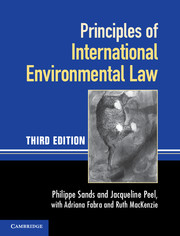Book contents
- Frontmatter
- Contents
- Foreword
- Preface and acknowledgments to the first edition
- Preface and acknowledgments to the second edition
- Preface and acknowledgments to the third edition
- Table of cases
- Table of treaties and other international instruments
- Abbreviations
- Part I The legal and institutional framework
- Part II Principles and rules establishing standards
- 6 General principles and rules
- 7 Atmospheric protection and climate change
- 8 Freshwater resources
- 9 Oceans, seas and marine living resources
- 10 Biological diversity
- 11 Hazardous substances and activities
- 12 Waste
- 13 The polar regions: Antarctica and the Arctic
- Part III Techniques for implementing international principles and rules
- Part IV Linkage of international environmental law and other areas of international law
- Index
- References
6 - General principles and rules
from Part II - Principles and rules establishing standards
Published online by Cambridge University Press: 05 June 2012
- Frontmatter
- Contents
- Foreword
- Preface and acknowledgments to the first edition
- Preface and acknowledgments to the second edition
- Preface and acknowledgments to the third edition
- Table of cases
- Table of treaties and other international instruments
- Abbreviations
- Part I The legal and institutional framework
- Part II Principles and rules establishing standards
- 6 General principles and rules
- 7 Atmospheric protection and climate change
- 8 Freshwater resources
- 9 Oceans, seas and marine living resources
- 10 Biological diversity
- 11 Hazardous substances and activities
- 12 Waste
- 13 The polar regions: Antarctica and the Arctic
- Part III Techniques for implementing international principles and rules
- Part IV Linkage of international environmental law and other areas of international law
- Index
- References
Summary
INTRODUCTION
This chapter describes the general principles and rules of international environmental law as reflected in treaties, binding acts of international organisations, state practice, and soft law commitments. The existence and applicability of ‘principles of international environmental law’ were confirmed by the arbitral tribunal in the Iron Rhine case. Such principles are general in the sense that they are potentially applicable to all members of the international community across the range of activities that they carry out or authorise and in respect of the protection of all aspects of the environment. From the large body of international agreements and other acts it is possible to discern general rules and principles that have broad, if not necessarily universal, support and are frequently endorsed in practice. These are:
(1) the obligation reflected in Principle 21 of the Stockholm Declaration and Principle 2 of the Rio Declaration, namely, that states have sovereignty over their natural resources and the responsibility not to cause transboundary environmental damage;
(2) the principle of preventive action;
(3) the principle of co-operation;
(4) the principle of sustainable development;
(5) the precautionary principle;
(6) the polluter pays principle; and
(7) the principle of common but differentiated responsibility.
In the absence of clear judicial authority, and in view of the conflicting interpretations under state practice, it is frequently difficult to establish the parameters or the precise international legal status of each general principle or rule. The application of each principle in relation to a particular activity or incident, and its consequences, must be considered on the facts and circumstances of each case, having regard to several factors, including: the source of the principle; its textual content and language; the particular activity at issue; the environmental and other consequences of the activity; and the circumstances in which it occurs (including the actors and the geographical region). Some general principles or rules reflect customary law, others may reflect emerging legal obligations, and yet others might have a less developed legal status. In each case, however, the principle or rule has broad support and is reflected in extensive state practice through repetitive use or reference in an international legal context.
- Type
- Chapter
- Information
- Principles of International Environmental Law , pp. 187 - 237Publisher: Cambridge University PressPrint publication year: 2012
References
- 2
- Cited by



